Gentleman's Agreement Blu-ray Movie
HomeGentleman's Agreement Blu-ray Movie 
Fox Studio Classics20th Century Fox | 1947 | 118 min | Not rated | Jan 15, 2013
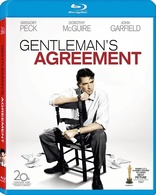
Movie rating
7.2 | / 10 |
Blu-ray rating
| Users | 4.5 | |
| Reviewer | 4.0 | |
| Overall | 4.0 |
Overview
Gentleman's Agreement (1947)
Gregory Peck plays a journalist who goes undercover as a Jew to expose anti-Semetism in post-war America.
Starring: Gregory Peck, Dorothy McGuire, John Garfield, Celeste Holm, Anne RevereDirector: Elia Kazan
| Romance | Uncertain |
| Drama | Uncertain |
| Melodrama | Uncertain |
Specifications
Video
Video codec: MPEG-4 AVC
Video resolution: 1080p
Aspect ratio: 1.37:1
Original aspect ratio: 1.37:1
Audio
English: DTS-HD Master Audio 2.0 Mono (48kHz, 24-bit)
French: Dolby Digital 2.0 Mono (224 kbps)
Spanish: Dolby Digital 2.0 Mono (224 kbps)
Subtitles
English SDH, Spanish
Discs
25GB Blu-ray Disc
Single disc (1 BD)
Playback
Region free
Review
Rating summary
| Movie | 4.0 | |
| Video | 4.0 | |
| Audio | 4.0 | |
| Extras | 3.0 | |
| Overall | 4.0 |
Gentleman's Agreement Blu-ray Movie Review
Elia Kazan takes on the prejudice of post-war America.
Reviewed by Casey Broadwater January 22, 2013While it's easy to retrospectively equivocate America fighting Germany during WWII with America fighting specifically in support of Europe's oppressed
Jews, the U.S.'s motivations during the war had little to do with stopping Nazi Germany's systematic, state-sponsored ethnic cleansing. And when the
war ended, with some six million Jews dead and millions more displaced, anti-Semitism was still very much an unsavory reality in American life. No, we
didn't have pogroms or slave labor, but we did have institutionalized discrimination of the unspoken, white-washed variety—"gentleman's
agreements"—with landlords denying Jews as tenants, employers tossing out resumes with typically Jewish names, and neighborhood residents
subversively trying to keep out "undesirables."
Made in 1947, the film Gentleman's Agreement called out this de facto cultural trend for what it was—base, unfounded, entirely shameful
prejudice—stirring up Hollywood controversy in the process. When he experienced discrimination firsthand on the false assumption that he was Jewish
—he was denied membership to a country club—20th Century Fox producer Darryl F. Zanuck decided to make the film, despite the concerns of his
Jewish colleagues, who worried the movie would only whip-up America's sleepy anti-Semitism into a more-active fervor. In what would become the
first in his series of "big issue" pictures, future On the Waterfront director Elia Kazan eagerly took on the project, which issues a direct
challenge to the idea that it's better to suffer quietly than make thing worse. In Gentleman's Agreement, only blatant, brutal honesty can
shock people—especially those who are otherwise kind, and perhaps unintentionally racist—out of their backwards attitudes.

But before the honesty, there needs to be some clever subterfuge. Based on the novel by Laura Z. Hobson—and adapted by screenwriter/playwright Moss Hart—the film centers around a bit of deceit that prefigures some of the gonzo first-person journalism of the 1970s. Gregory Peck plays Philip "Schuyler" Green, a writer who's recently relocated to New York with his young son, Tommy—a tiny Dean Stockwell, in one of his earliest screen roles —and elderly mother (Anne Revere). Magazine editor John Minnify (Albert Dekker), a concerned gentile, assigns him to write a multi-part series on anti-Semitism, but Green struggles to find a new angle on the material and nearly gives up the story. ("What can I say that hasn't already been said before?") When thinking about his Jewish pal, Dave (John Garfield)—a soldier still stationed oversees—Green has an epiphany. Instead of merely regurgitating the facts and figures of pervasive anti-Jewish sentiment, he decides to become a Jew—or, at least, pose as one—and write about the discrimination he experiences on a daily basis. He even has a title ready to go: "I Was Jewish for Six Months." He'll only last eight weeks, though; his ruse has unintended consequences, breaching into his personal life, affecting his son, and uncomfortably exposing the latent bigotry of those around him.
Much of the drama emerges from Green's stormy romantic relationship with his editor's niece, Kathy (Dorothy McGuire), a divorced schoolteacher who's wary about love but falls for the intrepid writer within days of meeting him. Kathy sees herself as progressive—she actually suggested the anti- Semitism article to her uncle—but her liberalism is more in theory than in practice. When faced with the realities of prejudice, she opts to either politely shush it or ignore it entirely, and this causes no small strain between the two sweethearts. When Kathy's sister offers to throw them an engagement party in her posh New England neighborhood, Green—with a newfound sense of justice—refuses to downplay his "Jewishness" for the bigoted guests, causing an uneasy argument. Later, Kathy reveals she owns an cottage in this snobby hamlet, but refuses to rent it to Green's friend Dave—back from the war, with no place to live—because it would offend the sensibilities of the neighbors and ruin their tidy, all-Christian enclave. Kathy would rather quietly accept racism than disrupt the illusion of upper-class "goodness," and it takes a long time for her to learn that downplaying the problem is just as much of a moral offense as participating in it.
Inside this narrative arc, the film goes on episodic tangents to show just how widespread anti-Jewish sentiment was at the time. When Green's mother gets sick, a doctor casually warns him not to take her to a Jewish specialist, who may rip them off. Tommy gets bullied at school and called derogatory names. A resort manager rescinds Green's honeymoon reservation. Viewed from the more inclusive, multi-cultural America of 2013, Gentleman's Agreement can seem a tad heavy handed now—it's hard for us under-40 folk to imagine a time when racism was so ingrained in American culture —and there's a surfeit of preachy, theatrical dialogue. That said, the film needed its blunt-force honesty and obviousness to beak through the wall of silence surrounding post-war anti-Semitism.
The movie won the Academy Awards for Best Picture and Best Director in 1948, and it holds up today as a classic example of well-made, socially conscious studio filmmaking, with masterful black and white cinematography by Arthur C. Miller (How Green Was My Valley), and—most notably—fine performances from its leads. Peck and Dorothy McGuire work beautifully together, the former resolute and stubborn, the latter guarded and conflicted. Both were nominated for Academy Awards, and though they didn't win, supporting actress Celeste Holm did pick up an Oscar for her role as spunky Anne Dettrey, the magazine's "man-eating" fashion editor and Green's friend in a time of need.
Gentleman's Agreement Blu-ray Movie, Video Quality 
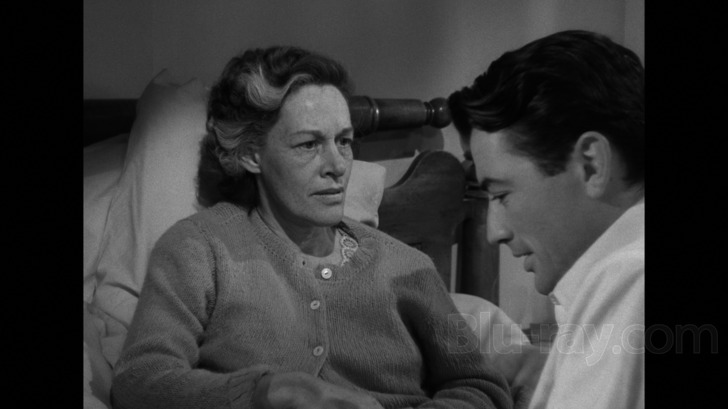
I always look forward to these catalog releases from 20th Century Fox, because they do such a damn good job with them. Gentleman's Agreement is no exception, arriving on Blu-ray with a 1080p/AVC-encoded transfer of a print that's been wonderfully restored. Natural 35mm film grain is kept intact—no digital noise reduction or edge enhancement here—while damage and debris has been completely removed. Beyond a few blink- and-you'll-miss-'em white specks, the image is absolutely pristine—no scratches, no hairs, no judders or skipped frames. The only evidence that you're watching a print from the 1940s are the occasional brightness/contrast fluctuations, which are too slight and fleeting to really be noticed. Generally, the black and white gradation is excellent, with strong but not overpowering blacks and highlights that never blow out. This transfer really makes the most of Arthur C. Miller's cinematography, which shows a masterful control of light and shadow. And although there are a few softish shots here and there, most of the film is wonderfully sharp and detailed in closeup, from the chiseled good looks of Gregory Peck's face to the visible clothing textures of the classy mid-century suits and dresses. It's hard to imagine the film looking much better.
Gentleman's Agreement Blu-ray Movie, Audio Quality 
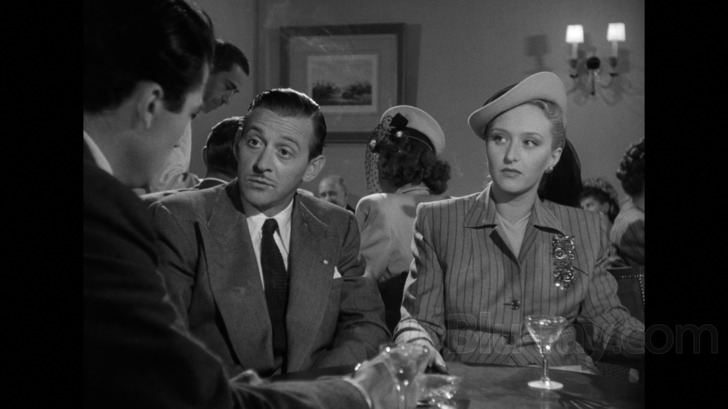
Not to be outdone, the film's lossless DTS-HD Master Audio mono track is as clear and dynamic as we can reasonably expect an audio mix from the '40s to be. Most importantly, dialogue is perfectly balanced and always easily understood, with no high-end crackles or muffling, not even during the few instances where Schuyler and Kathy raise their voices at one another. Similarly, famed composer Alfred Newman's orchestral score is clean and fairly full, lacking the thin, tinny quality of some recordings from the era. If there was any damage to the track, it's been almost completely attenuated here— there are no pops, hisses, crackles, sudden dropouts, or any other problems to report. The disc also includes Spanish and French Dolby Digital mono dubs, along with optional English SDH and Spanish subtitles.
Gentleman's Agreement Blu-ray Movie, Special Features and Extras 
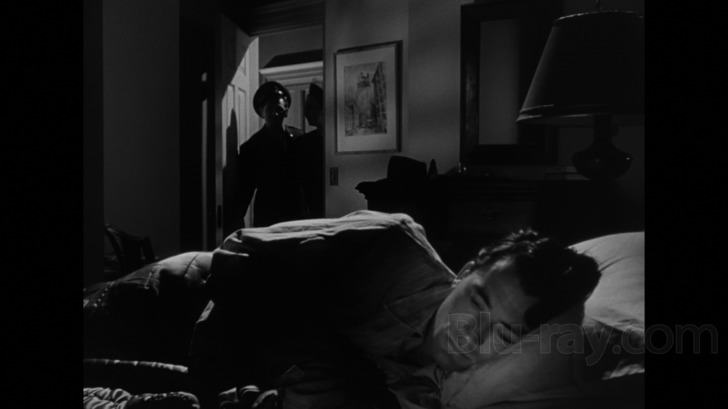
- Audio Commentary: The disc includes the same patchwork audio commentary that was included on the previous DVD, featuring reminiscences by co-stars June Havoc and Celeste Holm, along with more critical commentary by Richard Schikel, of TIME magazine. And I mean critical. Schikel has no qualms pointing out the film's flaws, although he also offers up some informative backstory on Kazan, the making of the film, and the era in which it was made.
- AMC Backstory: Gentleman's Agreement (SD, 24:27): A made-for-TV mini-documentary that explores the making of the film and its historical context, from the attitudes of Jewish Hollywood execs to the The Nuremberg Trials to Elia Kazan's testimony before The House Committee on Un-American Activities.
- Movietonews (HD, 1:32, 00:55): Here, you'll find two brief newsreel clips, "Oscars Presented for Motion Picture Achievements" and "Hollywood Spotlight: Darryl Zanuck Honored for Producing Best Picture of 1947."
- Theatrical Trailer (HD, 3:00)
Gentleman's Agreement Blu-ray Movie, Overall Score and Recommendation 
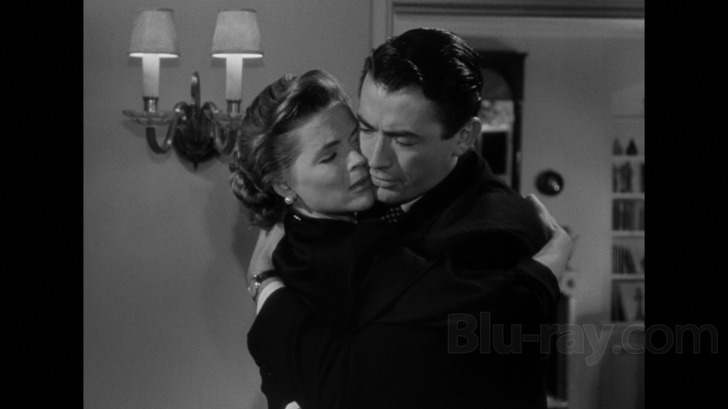
The first of Elia Kazan's "big issue" films, Gentleman's Agreement expresses righteous indignation at the widespread anti-Semitism in post-war 1940s America, taking on the then-hush-hush topic by baldly calling it out for what it was and is—simple, unfounded prejudice. If the film feels a little didactic now, it's only because Kazan needed a blunt cinematic object to get the point across, particularly in a time when Americans were in denial about their racial/ethnic attitudes. Although it's not Kazan's best picture—his best work was to come—it did win Best Picture and Directing Oscars at the 1947 Academy Awards, and features some dynamic acting by Gregory Peck and Dorothy McGuire. Additionally, 20th Century Fox's Blu-ray restoration of the film is remarkable, making this an easy recommendation for fans of classic mid-century Hollywood drama.
Similar titles
Similar titles you might also like

The Clock
Warner Archive Collection
1945

The Way We Were 4K
50th Anniversary
1973

The Longest Ride
2015

Yanks
Limited Edition to 3000
1979

The Notebook
2004

Random Harvest
1942

Wild River
Fox Studio Classics
1960

Mrs. Miniver
1942

Ten North Frederick
Limited Edition to 3000
1958

Since You Went Away
The Roadshow Edition
1944

The Enchanted Cottage
Warner Archive Collection
1945

Mr. Blandings Builds His Dream House
Warner Archive Collection
1948

Learning to Drive
2014

A Stranger Among Us
1992

Jane Eyre
Limited Edition to 3000 - SOLD OUT
1943

Imitation of Life
1959

The Best of Everything
Limited Edition to 3000
1959

The Other Love
1947

Far from Heaven
2002

Casablanca 4K
80th Anniversary Edition
1942